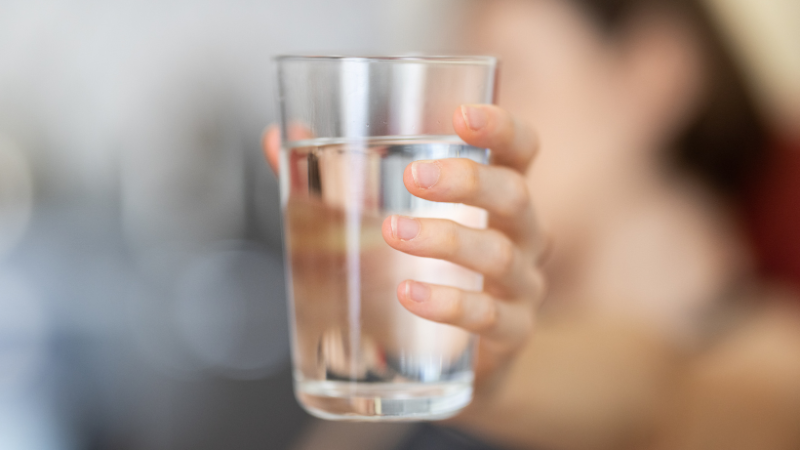As a nutritional counselor, I find myself talking about water quite a bit with clients. It’s one of the easiest and most beneficial things we can change to improve our health. Our bodies are around 70% water. Dr. F. Batmaghelidj, author of Your Body’s Many Cries for Water, states that “Water is the basis of all life and that includes your body. Your muscles that move your body are 75% water; your blood that transports nutrients is 82% water; your lungs that provide your oxygen are 90% water; your brain that is the control center of your body is 76% water; even your bones are 25% water.” It is recommended to drink ½ your body weight in ounces of water each day. So a 150 pound person would optimally drink 75 ounces of water daily.
There are varying opinions about the condition of our tap water. Dr. F. Batmaghelidj as well as other health professionals thinks that the US supply of tap water is perfectly healthy to drink. Others, such as Dr. Paul Connett report that fluoride in our tap water supply is dangerous. 97% of Western European countries agree with me as they have stopped putting fluoride in their drinking water. The Centers for Disease Control states that fluoride’s “predominant effect is post eruptive and topical.” And, by putting it in our water supply, there is no way to determine how much fluoride a person receives. It’s used in baked goods, tea, coffees, steaming vegetables, ice cubes, etc. Lastly, the fluoride used in our tap water isn’t pharmaceutical grade, but rather hazardous waste products of the phosphate fertilizer industry. Surprisingly, it is illegal to dump these same chemicals into our rivers and lakes or release the parent gases into the atmosphere but is deemed safe to put in our drinking water. It’s worth researching more and forming your own opinion.
 Distilled water removes impurities and minerals from tap, well, and sea water through distillation which involves boiling the water and then condensing the steams into a clean container. The process is invaluable to areas that lack sufficient clean drinking water. Of course, it’s better to drink water without harmful microbes and chemicals; there are some concerns about the long term benefits of distilled water. Drinking distilled water has been said to leach and electrolytes and minerals out of the body.
Distilled water removes impurities and minerals from tap, well, and sea water through distillation which involves boiling the water and then condensing the steams into a clean container. The process is invaluable to areas that lack sufficient clean drinking water. Of course, it’s better to drink water without harmful microbes and chemicals; there are some concerns about the long term benefits of distilled water. Drinking distilled water has been said to leach and electrolytes and minerals out of the body.
Spring water also known as mineral water flows out of springs in the earth. This water naturally contains minerals. The naturally-occurring minerals often make the taste of spring water more preferable to distilled or tap water. Manufactures who sell spring water test for certain microbes and chemicals, but do not test for all of them; so there could be potential challenges with spring water as well. 
The most important factor to remember about water is to drink it! Which type of water is best for you depends on a number of factors such as your location, financial ability and state of health. Tap water is of course the most economical and most widely available and is better than not drinking water on a consistence basis. With the level of toxicity rising around us I’d rather play it safe and avoid tap water when possible. We get enough of it through eating out and drinking sodas. Distilled water can save lives in a catastrophe or in 3rd world country where the water supply has been compromised, but in my opinion is not the best option for day to day drinking water. Spring water is Mother Natures’ gift to us. These days it is purified to remove a number of chemicals and microbes and is to me the best option for optimal health.



